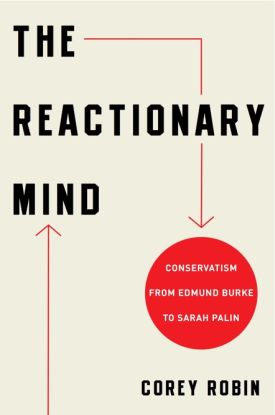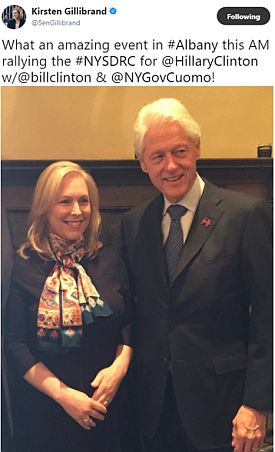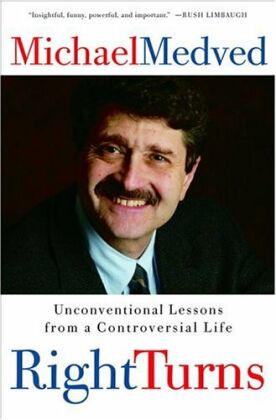The Echo Chamber
The Reactionary Mind: Conservatism from Edmund Burke to Sarah Palin
By Corey Robin
Oxford, 290 pp., $29.95
Corey Robin, who teaches political science at Brooklyn College and the CUNY Graduate Center — if “teach” and “science” are understood in their broadest senses — includes in this new collection of his works one from The London Review of Books of 2005 titled “Protocols of Machismo.” In it he does pretty much what he does in all the book’s other pieces by applying an ideological template to familiar material in order to make it seem unfamiliar. Those of us without the benefit of this ideological template may think the world is one way but, by donning Professor Robin’s special 3-D glasses, we can see that it is quite different from what we have supposed. In this case, the extensive literature about war and the causes of war, together with the whole segment of human history which it takes as its field of study are swept away at a stroke. The whole idea of “national security,” that “idée fixe of the twentieth century” as he calls it, is a mere illusion, a false ideology dreamed up by testosterone-crazed leaders as an excuse for their romantic fantasies of violence.
What’s striking to me about this and similar operations, which are diligently and industriously carried out in piece after piece in this volume, is how naive the operator must be, how lacking in any sense of self irony, not to see how condescending he is to his audience, as well as to those he characterizes, implicitly, as delusional. Or maybe he does see it and doesn’t mind, since no one is likely to read a book like this apart from the sort of ideologues who don’t mind. Not only are they predisposed to believe that everyone else is as ideologically-driven as they are, but they are used to being lectured at by their chosen wise men while being made privy to secrets that only the wise men know. Indeed, they welcome the schoolmasterish hectoring because it contains within it the promise that they, too, may be wise men by and by, adepts of the hidden knowledge that they can in their turn impart to eager disciples.
Professor Robin’s book is typical of many of today’s polemics in not being a voice in a dialogue — or even an attempted synthesis of some dialectic. Rather it is an attempt by intellectual legerdemain to shore up the crumbling foundations of the intellectual and utopian left. Having first established that it is a law of nature or history that subordinates must wish to overthrow their superiors and rule themselves, he then purports to show that everything conservatives may say or think, or think they think, and however great the differences between them may seem, they are really all saying just one thing, the same thing, which is that the subordinates must instead be kept in their place. “Conservatism,” he writes, “is the theoretical voice of this animus against the agency of the subordinate classes.”
Thus he sets up for his own convenience the nice binary system beloved of revolutionaries everywhere, a system which measures everything as either serving or opposing the revolution. Counter-revolutionaries whatever may be their philosophies or political programs, are really all the same: the Tea Partier does not differ in any significant way from the Nazi, nor does the Republican county commissioner differ from the slave owner: the one is merely the other in disguise. “I treat the right as a unity, as a coherent body of theory and practice that transcends the divisions so often emphasized by scholars and pundits,” he writes.
I use the words conservative, reactionary, and counterrevolutionary interchangeably: not all counterrevolutionaries are conservative — Walt Rostow immediately comes to mind — but all conservatives are, in one way or another, counterrevolutionary. I seat philosophers, statesmen, slaveholders, scribblers, Catholics, fascists, evangelicals, businessmen, racists, and hacks at the same table: Hobbes next to Hayek, Burke across from Palin, Nietzsche in between Ayn Rand and Antonin Scalia, with Adams, Calhoun, Oakeshott, Ronald Reagan, Tocqueville, Theodore Roosevelt, Margaret Thatcher, Ernst Jünger, Carl Schmitt, Winston Churchill, Phylls Schlafly, Richard Nixon, Irving Kristol, Francis Fukuyama, and George W. Bush interspersed throughout.
It tells you something about our intellectual culture that he sees this confident abolition of the most elementary intellectual distinctions as a recommendation of his work rather than a discredit to it. Everywhere the argument is the same: x is just like y is just like z — except for all the ways they aren’t alike at all. When, for example, the professor purports to prove an essential identity between the doctrines of Ayn Rand and Naziism, even he can hardly imagine some Randian interlocutor’s encountering his supposed proof and suddenly exclaiming: “Oh, gosh. I never dreamed that what I was subscribing to when I read Atlas Shrugged was actually the Holocaust. You have convinced me, Corey Robin, to become a communist like you.”
In short, he has merely reproduced the left’s classic self-verifying system, also known as arguing in a circle or begging the question. That is, if you first assume that history has a direction and that, ipso facto, this is the right direction, then it follows that anyone standing in the way of or in any way interfering with history’s arrival at its predestined end must be (a) wrong and (b) futile in his opposition — in short a “reactionary.” But without that prologue, that intellectual framework which gives the word its meaning, it has no meaning. Assuming that we alleged reactionaries do not believe in the inevitability of history’s direction and destination, the word “reactionary” cannot be said to apply within our universe of discourse, and someone like Professor Robin who uses the word is communicating his ideas about it — assuming he is communicating, assuming he has any ideas — only to those who share his own belief system. To everyone else, his words are gibberish.
The word “reactionary” is a legacy of the French Revolution, invented by the revolutionaries to describe those who stood in the way of the revolution’s progress. According to the OED, this original meaning of the word has more recently, and “loosely,” come to mean only “extremely conservative,” which is how most people now use it. But speaking as an extreme conservative myself, I don’t think I have ever heard “reactionary” used quite without a hint of its revolutionary subtext. In any case, Professor Robin is as much a purist about the revolutionary language as he is about his revolutionary principles and wants to wrestle it back into its original meaning as expressive of a revolutionary’s point of view. The reactionary is the enemy, however he may attempt to adapt himself to progressive ideas.
Conservatives and liberals may believe they are reasoning with each other and with the revolutionaries, but Professor Robin knows better. All their carefully considered thoughts are worthless to him, since they are all merely reactionaries — just as, to an Islamic terrorist, both they and the revolutionary professor are merely infidels. Opponents of the revolution may be monarchists, democrats, republicans, moderates, anarchists or merely conservatives who dislike change, but to the revolutionary, the particular form their opposition takes is irrelevant. The only thing that matters is that it opposes. When the revolutionary knows that about someone, he knows all he needs to know. And also, all too often, what he needs to do. In the first identification of the “reaction,” you have the beginning of the Terror.
To say, as the author does, that “conservative ideas are a mode of counterrevolutionary practice” is another way of saying that they are not ideas at all. Only revolutionary ideas are truly ideas, since counterrevolution is by definition only a reaction against them. And if conservatives have no ideas worthy of the name, then they are outside the realm of discourse in which and in which only the professor and his ideological confreres can operate. In a way, then, he must be understood as saying the opposite of what he says, since only conservative ideas can be ideas as they are normally understood by people outside his ideological bubble. Revolutionary “ideas” are really only reflexes: the reflex to destroy wherever it appears any accumulation of power or privilege in the hands of a few. Ecrasez l’infame!
That’s an idea, singular, if you stretch a point. But it’s the only one he has, apart from the negative one that conservatives have no ideas. In purporting to discover that “conservatism arose in reaction to the French Revolution,” Professor Robin only means to deny that the more than 200 years of history since can have contributed anything new to conservatism, which remains merely this reflex of opposition. Once again, no one who doesn’t already believe this is going to be persuaded by such an argument. But there will doubtless be some readers who won’t know that they believe it until they have read Professor Robin’s book — and then congratulated him and themselves for knowing something that we poor benighted conservatives, obsessed with the merely illusory differences between ourselves, do not know.
Discover more from James Bowman
Subscribe to get the latest posts to your email.







